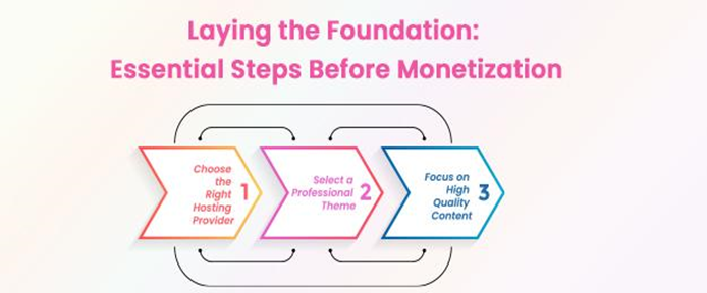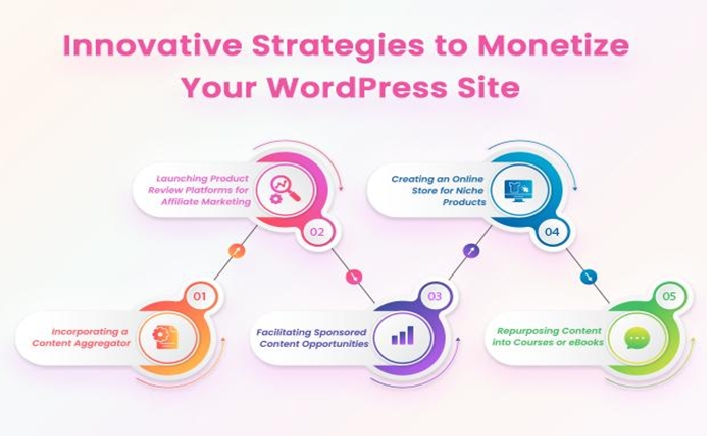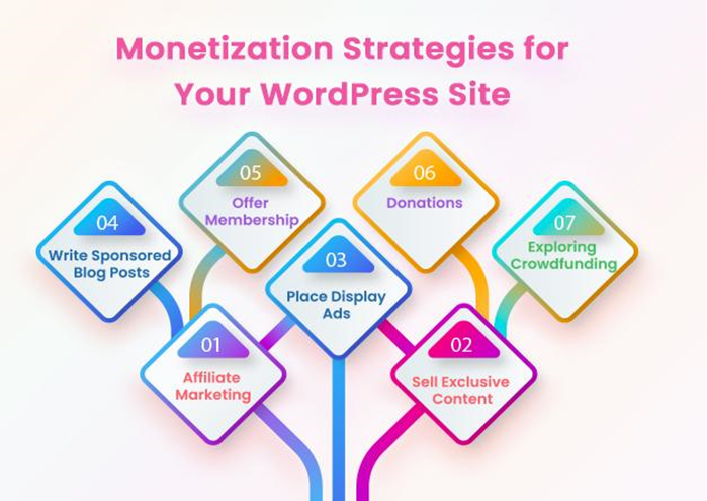Turning a WordPress blog into a thriving business is a journey filled with opportunities, challenges, and the potential for substantial rewards. As the platform of choice for millions of websites worldwide, WordPress offers a versatile and user-friendly environment for bloggers and business owners alike.
In this comprehensive guide, we'll delve into the strategies and steps necessary to monetize your WordPress site effectively. Whether you're a solo blogger or a budding WordPress development company, these insights will help you transform your passion into a profitable venture.
Understanding the WordPress Ecosystem
Before we dive into monetization strategies, it's crucial to understand the WordPress ecosystem. WordPress is a powerful content management system (CMS) that enables users to create, manage, and scale websites with ease. Its flexibility and extensive plugin library make it an ideal platform for everything from simple blogs to complex e-commerce sites.
Key to WordPress's appeal is its open-source nature, allowing for extensive customization and scalability. This is where WordPress development companies come into play, offering specialized services to customize and enhance WordPress sites, tailoring them to specific business needs.
Laying the Foundation: Essential Steps Before Monetization

Choose the Right Hosting Provider
Your choice of hosting provider can significantly impact your site's performance, security, and scalability. Opt for a provider specializing in WordPress for optimized performance and support.
Select a Professional Theme
A professional and responsive theme is crucial for creating a positive first impression. Invest in a premium theme that aligns with your brand and offers flexibility for customization.
Focus on High-Quality Content
Content is king in the digital world. Consistently produce high-quality, valuable, and engaging content that resonates with your target audience. This will help attract and retain visitors, setting the stage for successful monetization.
Innovative Strategies to Monetize Your WordPress Site

Transforming your WordPress site into a revenue-generating platform requires creativity and a strategic approach. Here are five innovative strategies to monetize your WordPress site, each tailored to leverage the unique strengths of your online presence:
1. Incorporating a Content Aggregator
- Overview: A content aggregator on your WordPress site collects and displays curated content from various sources related to your niche. This can draw more visitors by becoming a go-to resource for industry-related information.
- Monetization Potential: Monetize this feature by charging websites or blogs for inclusion in your aggregator. Additionally, you can integrate advertisements or sponsored content within the aggregated feeds.
- Implementation Tips: Use WordPress plugins designed for content aggregation to efficiently curate and display external content. Ensure to maintain high-quality standards and relevance to your audience's interests.
2. Launching Product Review Platforms for Affiliate Marketing
- Overview: Crafting detailed product reviews for items relevant to your audience can be a powerful way to engage readers and generate income through affiliate marketing.
- Monetization Potential: Earn commissions by including affiliate links within your reviews. The key is to build trust with your audience by providing honest, in-depth analysis and only promoting products you believe in.
- Implementation Tips:
- Focus on SEO to drive traffic to your reviews.
- Use a clear rating system and include both pros and cons to aid in consumer decision-making.
- Regularly update your reviews to keep them relevant and accurate.
3. Facilitating Sponsored Content Opportunities
- Overview: Sponsored posts are a direct way to monetize your WordPress site by creating content in partnership with brands or companies.
- Monetization Potential: These partnerships can be lucrative, especially if your site has a sizable and engaged audience. Pricing can be based on factors like post length, topic complexity, and your site's reach.
- Implementation Tips:
- Maintain transparency with your audience by clearly labeling content as sponsored.
- Choose sponsors that align with your site's values and audience interests to keep the integrity of your content.
4. Creating an Online Store for Niche Products
- Overview: Whether you're selling physical goods, digital downloads, or both, adding an eCommerce component to your WordPress site can tap into the shopping interests of your audience.
- Monetization Potential: Direct sales provide a straightforward revenue stream. Consider offering exclusive products that complement your content to enhance appeal.
- Implementation Tips:
- Utilize WordPress plugins like WooCommerce to set up your store.
- Ensure your product pages are well-designed and include high-quality images and descriptions.
- Implement secure payment options to build trust with your customers.
5. Repurposing Content into Courses or eBooks
- Overview: Transform your existing blog content into structured courses or eBooks. This approach not only breathes new life into your content but also caters to audience members preferring more structured or in-depth learning formats.
- Monetization Potential: Courses and eBooks can be sold directly on your site, creating another revenue stream. Pricing can vary based on the depth of content and the niche's average market rate.
- Implementation Tips:
- Use content management systems designed for courses or eBooks to package your content attractively.
- Offer free samples or chapters to give potential buyers a taste of what to expect.
- Market these products through your email list and social media channels to reach a wider audience.
By implementing these strategies, you can explore diverse revenue streams and find what best aligns with your WordPress site's strengths and your audience's interests. Each approach requires dedication and a focus on providing value to your audience, laying the foundation for a successful monetization strategy.
Monetization Strategies for Your WordPress Site

1. Affiliate Marketing
Affiliate marketing involves promoting products or services and earning a commission on sales made through your referral links. Join affiliate programs that align with your niche and audience interests, and integrate these links naturally into your content.
Affiliate marketing is a robust strategy for monetizing your WordPress blog. It involves promoting products or services and earning a commission for every sale made through your unique affiliate link. Here's how to excel in affiliate marketing:
- Choose Relevant Products: Select products that align with your blog's niche and your audience's interests.
- Transparent Promotion: Disclose your affiliate relationships to maintain trust with your audience.
- Quality Content: Use your content to add value, providing detailed reviews or how-to guides that incorporate affiliate links naturally. Top online resources like Authority Hacker and Affiliate Lab Review can help you level up your skills in this area.
2. Sell Exclusive Content
Selling exclusive content is a direct way to monetize your expertise and the quality information you provide. This can include:
- E-books and Guides: Compile your blog posts into comprehensive guides or write new e-books.
- Premium Articles: Offer in-depth articles on niche topics that can't be found elsewhere.
- Video Tutorials: Create and sell access to video content for tutorials, courses, or workshops.
3. Place Display Ads
Integrating display ads into your WordPress blog is a passive income strategy that can yield significant returns as your traffic grows. Consider these tips for success:
- Ad Networks: Join ad networks like Google AdSense for ease of use and access to a wide range of advertisers.
- Strategic Placement: Place ads where they are likely to get clicks without hindering the user experience.
- Balance: Keep a healthy balance between content and ads to avoid overwhelming your readers.
4. Write Sponsored Blog Posts
Sponsored blog posts involve collaborating with brands to create content that promotes their products or services. To effectively implement this strategy:
- Authentic Partnerships: Partner with brands that resonate with your blog's theme and ethics.
- Transparency: Always disclose sponsored content to your readers to maintain trust and comply with legal requirements.
- Quality Content: Ensure that sponsored posts provide value to your audience, integrating the promotion seamlessly into helpful and informative content.
5. Offer Membership
Creating a membership option for your WordPress blog can establish a steady income stream, offering exclusive content or perks to subscribers. Consider:
- Exclusive Access: Offer members-only content, such as articles, videos, or forums.
- Community Building: Use memberships to build a community around your blog, enhancing reader loyalty.
- Flexible Tiers: Implement different membership levels to cater to varying audience needs and price sensitivities.
6. Donations
Donations offer a straightforward way for your audience to show their appreciation for your work. Here's how to optimize your blog for donations:
- Integrate Donation Buttons: Tools like PayPal or platforms like Patreon make it easy to add donation buttons to your WordPress site. Place them prominently without disrupting the user experience.
- Communicate the Impact: Share with your readers how their donations will be used—be it for maintaining the website, creating new content, or supporting a cause you're passionate about.
- Offer Transparency: Regularly update your donors on the achievements and improvements made possible through their contributions. Transparency builds trust and encourages ongoing support.
7. Exploring Crowdfunding
Crowdfunding takes the concept of donations further by setting specific goals or launching projects that your audience can fund. This method is particularly useful for larger investments in your blog's future. Here are key considerations for successful crowdfunding:
- Choose the Right Platform: Kickstarter, Indiegogo, and GoFundMe are popular crowdfunding platforms. Select one that aligns with your project's nature and audience preferences.
- Create Compelling Campaigns: Your crowdfunding campaign should clearly articulate the value of the project, its goals, and the rewards for backers. High-quality visuals and a compelling narrative are essential.
- Offer Rewards: Provide incentives for different levels of pledges. This could range from exclusive content, merchandise, personal acknowledgments, or early access to new features or content.
- Promote Your Campaign: Utilize your blog, email lists, and social media channels to spread the word about your crowdfunding campaign. Engaging storytelling and regular updates can help maintain momentum.
Maximizing Revenue: Best Practices
Turning your WordPress blog into a revenue-generating machine is a nuanced process that demands a blend of creativity, strategy, and persistence. To truly maximize your monetization efforts, a focused approach toward SEO, social media marketing, and email marketing is essential. These pillars not only drive traffic but also engage and convert your audience into loyal subscribers or customers. Here’s how you can leverage these strategies effectively.
Elevating Your Blog with SEO
SEO stands at the forefront of increasing your site’s visibility in search engine results, which is pivotal for driving organic traffic. Implementing best SEO practices ensures that your content reaches its intended audience through higher rankings in search results. Here’s what you can do:
- Keyword Research: Identify and target keywords that your potential readers are searching for. Tools like Google Keyword Planner and SEMrush can provide insights into popular search terms within your niche.
- On-Page Optimization: Ensure that your posts are optimized for search engines, including using the right keywords in your titles, headings, and throughout the content. Also, optimize your images by using descriptive filenames and alt tags.
- Quality Content: Search engines favor websites that provide value to their users. Focus on creating high-quality, informative, and engaging content that addresses the needs and interests of your audience.
- Backlink Building: Backlinks from reputable sites can significantly boost your SEO ranking. Consider guest blogging, collaborating with influencers, or creating shareable content to earn quality backlinks.
Boosting Engagement Through Social Media Marketing
Social media marketing is a powerful tool to promote your content, engage with your audience, and increase your blog’s visibility. Here’s how to make the most of it:
- Choose the Right Platforms: Not all social media platforms will be right for your blog. Focus on where your target audience spends their time and tailor your strategy to these platforms.
- Consistent Posting: Maintain a regular posting schedule to keep your audience engaged and attract new followers. Tools like Buffer or Hootsuite can help manage your social media calendar.
- Engage with Your Audience: Don’t just post your content; interact with your followers by responding to comments, asking questions, and participating in discussions. This builds a community around your blog.
- Promote Your Content Smartly: Use eye-catching visuals, compelling captions, and hashtags to increase the visibility of your posts. Consider leveraging paid advertising options for broader reach.
Nurturing Relationships Through Email Marketing
Email marketing allows for direct communication with your audience, enabling you to promote content, share exclusive offers, and build deeper relationships. Here’s how to effectively use email marketing:
- Build Your Email List: Encourage blog visitors to subscribe to your newsletter. Offer incentives like free e-books, courses, or access to exclusive content as a signup bonus.
- Personalize Your Communications: Use your subscribers’ names and segment your list to tailor your emails based on their interests and behaviors. Personalized emails have higher engagement rates.
- Provide Value: Ensure that your emails offer value beyond promotions. Share useful tips, insights, or stories that resonate with your audience.
- Monitor and Optimize: Use analytics to track the performance of your email campaigns. Test different subject lines, content formats, and sending times to see what works best for your audience.
Scaling Your WordPress Site
As your blog begins to gain traction, scaling becomes crucial to accommodate increased traffic and content demands. Expanding your team or partnering with a WordPress development company can provide the expertise needed to enhance your site’s functionality, improve user experience, and manage content effectively. This strategic expansion can help maintain your blog’s growth momentum while ensuring the quality of your content remains high.
Conclusion
Monetizing your WordPress site is a multifaceted process that requires strategy, patience, and ongoing effort. By understanding the WordPress ecosystem, focusing on quality content, and implementing diverse monetization strategies, you can transform your blog into a lucrative business. Remember, success in monetization not only depends on the strategies you choose but also on the value you provide to your audience. Stay true to your niche, engage with your community, and continually optimize your site for the best results. With dedication and the right approach, your WordPress site can indeed become a thriving business.


 Table of Content
Table of Content










